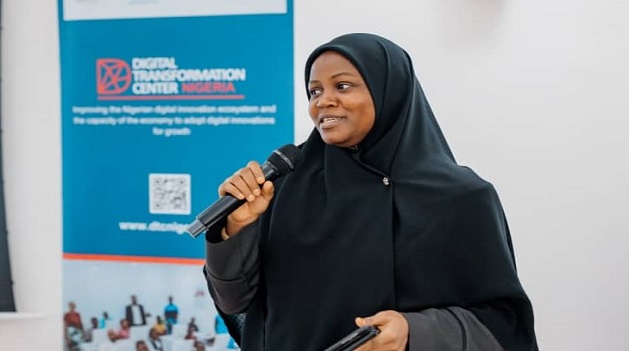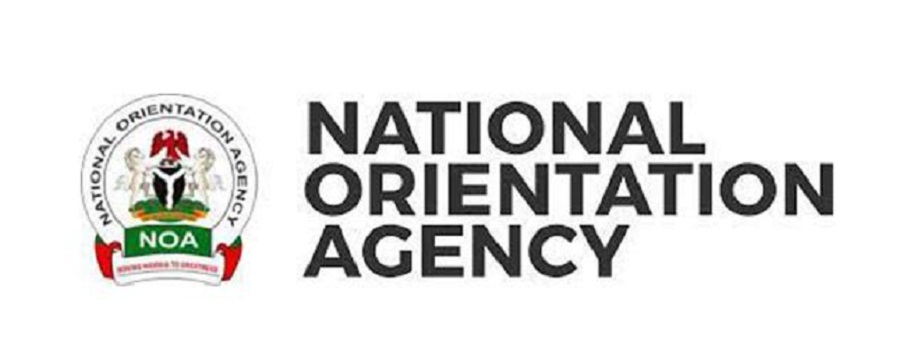News
NITDA, GIZ/DTC Engages Stakeholders in Lagos on NDLF

In a continuous effort to bridge the digital divide and empower Nigerians with essential digital skills, the National Information Technology Development Agency (NITDA), in partnership with the GIZ/DTC, held a Stakeholder Awareness on the National Digital Literacy Framework (NDLF) in Lagos.

The Director-General of NITDA, Kashifu Inuwa Abdullahi CCIE, in his opening remarks, emphasised the critical role of digital literacy skills in today’s rapidly evolving digital landscape. He highlighted the NDLF as a comprehensive roadmap developed by NITDA, in collaboration with key stakeholders to equip Nigerians with the necessary digital skills to thrive in the digital age.
Inuwa, who was represented by Dr. Falilat Jimoh, of the Digital Inclusion Unit of the Agency’s South West Zonal Office (SWZO), asserted that the collaborative efforts with the Ministry of Education were underscored, focusing on integrating the framework’s provisions into the national school curriculum. “This initiative aims to equip students from a young age with foundational digital skills essential for future success,” he noted.
Furthermore, he mentioned that NITDA’s partnership with GIZ/DTC is fostered to establish robust standards for digital literacy content, ensuring high-quality and relevant learning materials aligned with the NDLF’s objectives.
Inuwa stressed that NITDA’s commitment to digital inclusion extends beyond formal education, with ongoing digital literacy programs targeting women, artisans, and other underserved segments of the society.
He emphasised the importance of collaborative efforts, stating that the framework enables the implementation of NITDA’s Strategic Roadmap and Action Plan (SRAP) 2.0, 2024–2027 pillars, “Fostering Digital Literacy and Cultivating Talents”.
“The SRAP 2.0 is a living document that is being redrafted to align with the Federal Ministry of Communications, Innovation and Digital Economy policy document “Accelerating Our Collective Responsibility”, which has Five strategic pillars namely, Knowledge, Policy, Infrastructure, Innovation, Entrepreneurship & Capital, and Trade.
According to the NITDA boss, these programs aim to empower individuals to participate meaningfully in the digital economy and access online opportunities.
“This resonates with the Knowledge pillar of the Ministry tailored to accelerate the collective responsibilities of all stakeholders towards achieving inclusivity in all its dimensions which supports the Renewed Hope Agenda that is focused on propelling the Nigerian economy and enhancing the welfare of its citizens”, he said.
Hence, he stated that the workshop goal is to create widespread awareness about the NDLF through interactive sessions and discussions, providing stakeholders with a deeper understanding of its components, target audiences, and potential impact on bridging the digital divide among Nigerians.
Additionally, the Director-General emphasised the importance of collective action in the successful implementation of the NDLF, expressing gratitude for the collaboration with partners and the participation of stakeholders. He affirmed that the significance of tailoring the framework to the specific needs of Nigeria’s diverse population is to achieve maximum effectiveness.
In conclusion, Inuwa expressed confidence that the NDLF, coupled with collaborative efforts, will play a pivotal role in empowering Nigerians with the digital skills necessary to actively participate in the digital economy, and access online information and opportunities while contributing to a more inclusive and prosperous society. He then urged participants to continue collaborations to unlock the full potential of Nigeria’s digital future.
Earlier, Dr. Thuweba Diwani the Commission Manager GIZ/DTC Nigeria in her opening remarks delivered by Olusegun Alimi, the Technical Advisor, GIZ/DTC Nigeria, anticipated that the awareness session would be an avenue to dialogue and come up with a “Participatory Policy Implementation Framework (PPIF)” he added, “for policies to be sustainable they need to be owned by the people”.
The Digital Transformation Centre Nigeria (DTC Nigeria) is a project funded by the European Union and the German Federal Ministry for Economic Cooperation and Development, implemented by Deutsche Gesellschaft Fuer Internationale Zusammenarbeit (GIZ). It focuses on digitalization, innovation, and entrepreneurship in Nigeria, aiming to enhance the country’s digital innovation ecosystem and boost its capacity for adopting digital innovations for economic and societal growth.
Other Ministries, Departments and Agencies (MDAs) at the dialogue were, the National Orientation Agency (NOA), National Identity Management Commission (NIMC), Lagos Public Private Partnership (PPP), Lagos State Technical and Vocational Education Board (LASTVEB), Lagos State Employment Trust Fund (LSETF), also, the private sectors represented were MTN Foundation, CISCO, Tech4Dev, Faith Foundation among others.
The moderator, Mr. Tayo Olosunde an ecosystem industry enthusiast affirmed that the stakeholders’ sessions had also been held in Kano and Abuja.
News
NOA Uncovers Fraud by Banks, Universities in Students Loan Scheme

National Orientation Agency (NOA) has revealed that an investigation by its Community Orientation and Mobilisation Officers (COMO) uncovered unethical practices by some tertiary institutions, in collaboration with certain banks, that are depriving students of their rightful access to the Federal Government Student Loan Fund.

Paul Odenyi, deputy director of Communications and Media, in a statement Sunday, disclosed that several universities and financial institutions have been found engaging in fraudulent activities that prevent students from receiving the loans allocated to them.
Mallam Lanre Issa-Onilu, director general, NOA, shared these troubling findings following a high-level meeting with Mr. Akintunde Sawyerr, managing director, Nigeria Education Loan Fund (NELFUND), over the weekend.
According to NOA, preliminary reports led to an urgent intervention from NELFUND after it was discovered that some university officials had deliberately withheld critical details about student loan disbursements.
Further feedback from NOA confirmed that certain institutions, in collusion with banks, have intentionally delayed payments to approved applicants for dubious financial gain.
Additionally, some universities do not acknowledge the disbursements made by NELFUND to students.
Sawyerr confirmed that certain institutions have withheld information about loan payments issued in students’ names while still demanding tuition fees from them.
He warned that NELFUND is ready to take legal action against institutions found guilty of engaging in fraudulent practices.
He stated, “Recent findings by NELFUND have shown that some institutions have received student loan disbursements directly into their accounts yet neglect to inform the affected students or record the payments in their financial records, leading to unnecessary confusion.
“Withholding critical financial information from students is not only unethical but also a breach of the principles on which NELFUND was founded.
“We are prepared to take legal action against any institution engaged in such deceptive practices.”
The investigation revealed that in some instances, universities continued to demand full tuition payments from students, despite having already received the loan funds intended to cover those fees.
According to the NOA, this constitutes a gross violation of student rights and a betrayal of public trust.
Issa-Onilu, therefore, issued a strong warning to the institutions and collaborating financial institutions, demanding an immediate end to these actions.
He also directed all NOA state directorates to intensify feedback collection from students nationwide to aid the Federal Government in identifying and penalising the erring parties.
The NOA emphasised its commitment to transparency, accountability, and ensuring that students benefit fully from the government’s intervention in education financing.
The statement added that the investigation remains ongoing, and further actions are expected in the coming weeks.
General News
Nigeria Records $6.83Bn Balance of Payments Surplus in 2024 Amid Economic Reforms

Central Bank of Nigeria (CBN) has announced a remarkable $6.83 billion balance of payments surplus for 2024, marking a decisive turnaround from deficits of $3.34 billion in 2023 and $3.32 billion in 2022.

This achievement reflects the impact of sweeping macroeconomic reforms, stronger trade dynamics, and renewed investor confidence in the nation’s economic direction.
Speaking at the 36th Enugu International Trade Fair, Acting Director of Corporate Communications, Mrs. Hakama Sidi Ali, highlighted the CBN’s commitment to addressing economic challenges and fostering productivity, particularly for SMEs.
She emphasized the importance of robust financial systems, foreign exchange stability, and collaboration between monetary and fiscal authorities in achieving industrial development and global recognition.
The President of the Enugu Chamber of Commerce, Sir Odeiga Jideonwo, commended the CBN’s efforts but expressed concerns over the recent hike in interest rates, cautioning that it could hinder access to credit for businesses.
This surplus signals a positive trajectory for Nigeria’s economy, benefiting investors, businesses, and citizens alike.
News
Senate Committee Partners with Kuda Bank to Tackle Compliance Crisis as Nigeria Loses ₦3.4 Trillion

Over ₦3.4 trillion in financial infractions were uncovered across federal Ministries, Departments, and Agencies (MDAs) in 2021, according to the Auditor General’s report — a staggering figure that highlights Nigeria’s deepening compliance crisis and the urgent need for stronger oversight in public institutions.

In response, the Senate Committee on Legislative Compliance is hosting a high-level workshop to address the root causes of weak oversight and institutional gaps. The two-day event, with the theme ‘Consolidating Strategies for Strengthening Legislative Compliance by MDAs’, will take place on April 15 and 16, 2025 at NAF Suites, Abuja, bringing together lawmakers, regulators, and over two hundred representatives from federal MDAs.
Kuda Microfinance Bank is co-sponsoring the workshop as part of its commitment to supporting responsible innovation, governance, and regulatory alignment in Nigeria’s financial ecosystem.
Rasaq Kadri, Kuda’s Head of Compliance, will deliver a keynote address on the second day of the event, highlighting the efforts of Nigeria’s fintechs to promote inclusion and financial literacy without compromising on compliance best practices.
“When public funds go unaccounted for, it doesn’t just damage government credibility, it affects the entire financial ecosystem, including fintechs,” said Kadri. “We can’t build trust-driven products in a trust-deficient environment. Every time compliance is treated as a box-ticking exercise, we miss the chance to build something that lasts. Fintechs have the tools and perspective to support better governance, but more importantly, we have a responsibility to be part of the solution.”
As a sponsor, Kuda will take the workshop to engage directly with key stakeholders in Nigeria’s regulatory and public service ecosystem.
Plenary sessions will be chaired by the Honourable Attorney General of the Federation, Lateef Fagbemi SAN, and the Honourable Minister of Finance, Wale Edun. Conversations will focus on closing compliance gaps, strengthening institutional transparency, and promoting cross-sector collaboration.
The Senate Committee on Legislative Compliance Workshop is a unique platform for dialogue, knowledge-sharing, and collaborative action.

 E-Business2 days ago
E-Business2 days agoNITDA Warns Against Fake Google Play Store

 News2 days ago
News2 days agoNOA Uncovers Fraud by Banks, Universities in Students Loan Scheme

 General News2 days ago
General News2 days agoLagos Commences Integration of NIN with State Single Social Register

 E-Financial2 days ago
E-Financial2 days agoAfrica Loses $88.6Bn Yearly to Corruption- ECOWAS

 E-Financial2 days ago
E-Financial2 days agoUBA Redefines Banking with Next-Gen PoS Terminals and Revamped MONI App

 E-Financial2 days ago
E-Financial2 days agoNIBSS Heads to Court to Recover N4Bn Lost due to System Glitch

 E-Financial2 days ago
E-Financial2 days agoSEC Bans Unregistered Digital Asset Exchanges, Online Forex Platforms

 General News2 days ago
General News2 days agoNigeria Records $6.83Bn Balance of Payments Surplus in 2024 Amid Economic Reforms

























